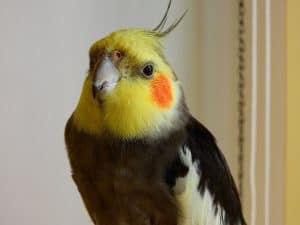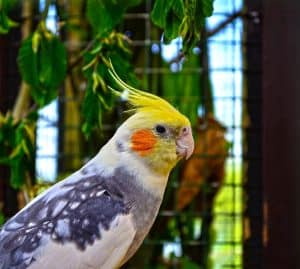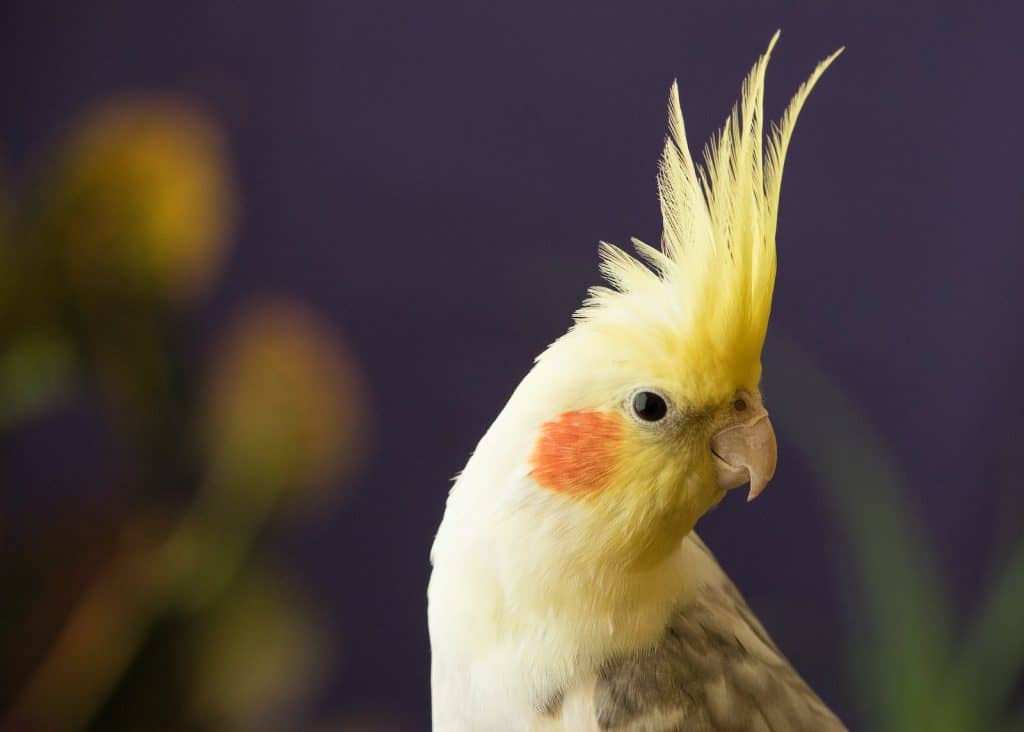Cockatiels, with their charming and expressive personalities, are among the most popular pet birds worldwide. Owners often find themselves captivated by the various behaviors exhibited by these delightful creatures. One such behavior that may catch the attention of cockatiel enthusiasts is the grinding of their beaks. So, why cockatiels grind their beaks?
Cockatiels engage in this repetitive motion where they rub the upper and lower parts of their beaks together. While this behavior may seem peculiar to some, it serves several important purposes in a cockatiel’s life. Understanding why cockatiels grind their beaks can provide valuable insight into their well-being and overall health.
In this article, we will explore the reasons behind this intriguing behavior and shed light on its significance for these charismatic avian companions.

Why Cockatiels Grind Their Beaks?
Cockatiels are not only colorful and friendly, but they also have a great personality. They become very close to their owners after some time, so it’s best to be prepared for that type of companionship.
Cockatiels, on the other hand, are little different from dogs and cats in many ways. They may display sophisticated behavior that you won’t be able to tell if they’re pleased or angry.
Cockatiels often grind their beaks as a form of amusement, but is it safe? Although it sounds harrowing to us humans, thankfully it is perfectly safe for cockatiels and usually signifies contentment.
Cockatiels usually grind their beaks before they go to sleep, which is a reflection of their relaxed state. If you see your cockatiel grinding its beak often, especially right before bedtime, it is probably normal behavior. However, you should not see excessive grinding in any way.
Other than biting the cage bars, a distressed bird will also frequently chew on them or engage in other destructive behavior such as excessive grooming and beak damage.
How Do Cockatiels Grind Their Beaks and What Does it Sound Like?
Did you know that cockatiels keep their beaks healthy by grinding them against each other? The upper jaw is called the maxilla, while the lower one is termed the mandible. When they do this, it makes a noise similar to dragging your nails across a table gently.
However, don’t be concerned because while it may appear to be frightening, it is completely safe and natural. This behavior has been observed in a number of birds in the wild.

Does Beak-Grinding Harm Their Beaks?
There are still lots of things we don’t know about birds, and one of them is the reason behind cockatiel beak-grinding, as well as what causes them to do it. That said, we do know that when they are happy and calm, they will grind their beaks. Understanding these behaviors is just as important as recognizing common illnesses in cockatiels, so you can ensure your bird stays healthy.
Moreover, birds that do this aren’t actually in pain, even though it might sound like they are. Some researchers theorize that one justification for this behavior is that the bird might be trimming its beak so it doesn’t get too long. Even though there’s no concrete evidence to support this claim, data suggests that this is a strong possibility. However, if you’re unsure about the condition of your cockatiel’s beak, it’s wise to consult a veterinarian rather than attempting wing trimming or other procedures yourself.
However, even if cockatiels grind their beaks to cut off the excess, it should not hurt them. It will most likely feel painless, much like trimming our nails. However, we recommend that you do not attempt to trim your bird’s beak yourself because it may cause a lot of discomfort to your pet. As a result, only a qualified veterinarian should undertake this procedure. Keeping an eye on your bird’s overall behavior and environment is crucial, especially if you suspect issues like avian flu, which can sometimes present subtle symptoms.
Should You Give Your Cockatiel Something to Grind its Beak On?
Again, beak grinding is completely natural, but if you’re concerned or think your bird is being too rough, we understand. You may always assist your cockatiel by offering them something to chew or grind their beak on in that case. There are several alternatives available, although a piece of cuttlebone would be a good choice if you want something healthy. Alongside cuttlebone, offering a variety of safe foods like bell peppers can keep your bird engaged and well-nourished.
Cuttlebone is not only a nutritious snack for your bird, but it’s also full of minerals such as calcium that your pet will benefit from. They’re cheap and easy to find, making them a great option for people who are looking for an affordable way to keep their bird healthy. Plus, cuttlebone is generally a good and safe way to keep your bird’s beak nice and trim without having to do anything on your part!
You may also buy a beak grinding stone for your pet in addition to the cuttlebone. While they may appear strange or frightening, grinding stones are simply rough perches that provide nourishment for birds. As a result, not only can your bird sit on them, but it can also sharpen its beak on them. So while allowing your cockatiel to grind its beak on its own every day is sufficient enjoyment, providing it with a grinding stone and some cuttlebone will go a long way. If you’re introducing new items to your cockatiel’s cage, be mindful of potential escape routes to ensure their safety.
- Parrot Essential Toy: The bird parrot toy provides essential physical activity to keep your feather friends stable and happy, and improve your health. There are several multi-colored blocks in this single toy to entice your bird. These blocks are arranged in multiple layers to climb and explore.Birds also love to untie cotton rope knots, which satiates their natural urge to chew.
- Safe To Chew: Our wood parrot toys are made of pure natual wood & cotton rope, all of them are dyed by edible pigments, and completed with pure handmade which are more bite resistand and durable.
- Perfect Size: The size is 13.78" X 5.12". perfect size for small and medium birds. It is suggested for african greys, budgies, parakeets, cockatiels, conures, lovebirds and other similar sized birds. Provide your bird an ideal elevated place to chew and climb.
- Beak Trimmed: Parrot's beak keeps growing to keep sharp. if her beak is long can affect the ability of the parrot to eat and damage her health. Our parrot chew toys contain colored wooden blocks and other accessories in various shapes to attract your parrot to chew, help your feather friends to preen and condition their beak.
- Best Gifts For Your Parrot: It is designed in bright color, which can easily attract parrots attention in short time and they will play with these toys for long time daily, keep your parrots busy, less destructive and have more fun hours.
Other Beak-Related Behavior
Cockatiels engage in various beak-related activities aside from beak grinding. Beak bashing, for example, is when a cockatiel bangs its beak against a mirror or another item. Typically, you’ll hear this as a rapid tapping sound as well as a hard thump. Not to worry, since beak banging is simply courtship and mating behavior, so your pet will do it if it lives with a female.
Furthermore, cockatiels’ beaks are strong enough to withstand the impact, and it doesn’t hurt them at all. In addition to courtship displays, cockatiels also tend to tap on things to try and get your attention, so make sure that you’re spending time with your pet daily! Chances are if you provide them with enough attention, then they’ll probably start tapping as soon as they see you.
Final Thoughts on Why Cockatiels Grind Their Beaks
In conclusion, beak grinding is a strange behavior that can confuse or alarm any beginning birdkeeper. Luckily, it’s simply how your bird finds relaxation, so there’s nothing to worry about at all! Just bond with your bird daily, feed it a healthy and well-balanced diet, give it a spacious place to live in, and know that the next time you hear that bird grinding noise, it’s a sign that you’re doing great as a pet owner.
Related Articles to Why Cockatiels Grind Their Beaks?
Complete Cockatiel Bird Language And Behavior Guide
What is my cockatiel trying to tell me?
What are common cockatiel behaviors?
- Why Is My Cockatiels Poop Watery
- Why Is My Cockatiel Vomiting
- Why Is My Cockatiel So Quiet
- Why Is My Cockatiel Shaking
- Why Is My Cockatiel Losing Feathers
- Why Is My Cockatiel Laying Eggs On Bottom Of Cage
- Why Is My Cockatiel Eating So Much
- Why Is My Cockatiel Chirping So Much
- Why Does My Cockatiel Scream When I Leave The Room
- Why Does My Cockatiel Nibble Me
- Why Does My Cockatiel Keep Yawning
- Why Does My Cockatiel Hang Upside Down
- Why Does My Cockatiel Fly On My Head
- Why Does My Cockatiel Face The Wall 6 Reasons
- Why Does My Cockatiel Bob His Head
- Why Does A Cockatiel Stand On One Leg
- Why Do Cockatiels Sing
- Why Do Cockatiels Hiss
- Why Do Cockatiels Have Crests
- Why Do Cockatiels Eat Their Poop
- Why Do Birds Rub Their Beaks
- Why Do Birds Poop In Their Water
- Why Cockatiels Like Head Scratches
- Why Cockatiels Grind Their Beaks
- Why Choose A Cockatiel Bird As A Pet
- Why Are My Cockatiels Tail Feathers Falling Out
- Why Are My Cockatiels Fighting
- Why Are My Cockatiels Feet Warm
- Why Are Cockatiels So Dusty




